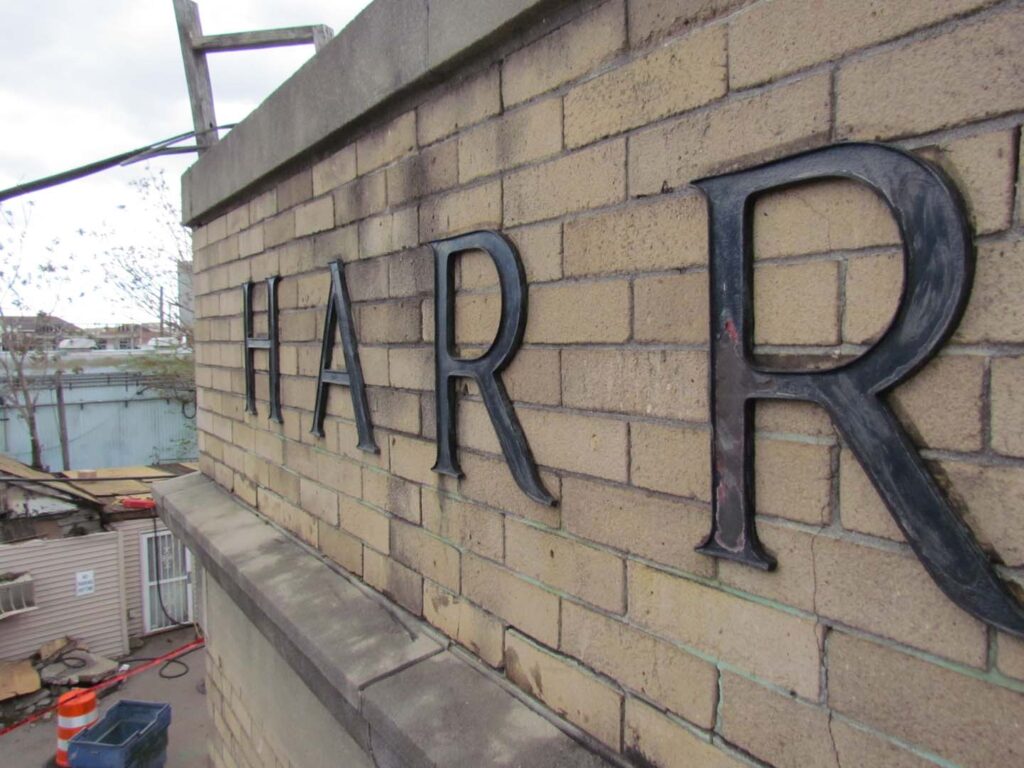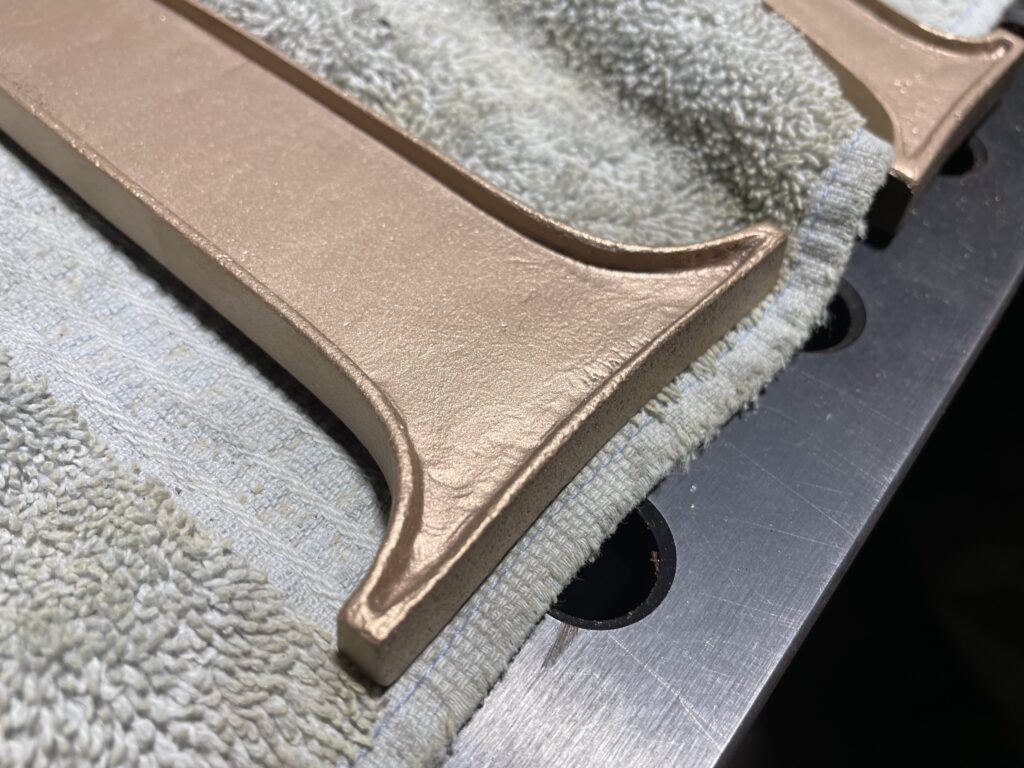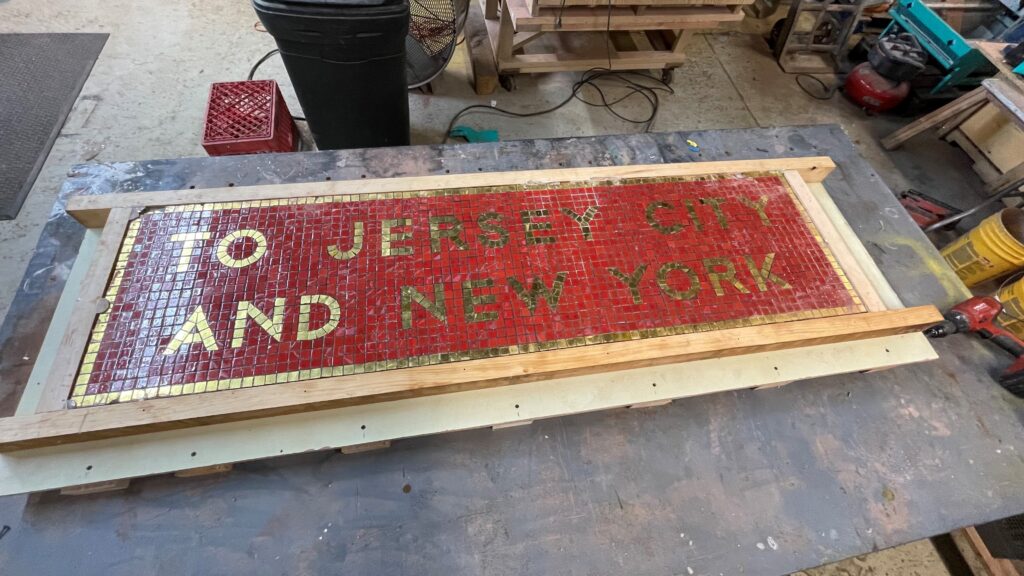

In the Fall of 2022, Western’s NYC Metro branch was hired as a subcontractor to Conti Civil to restore a handful of historic elements as part of the rehabilitation of the Harrison PATH Station in Harrison, New Jersey. The elements were identified as part of the fabric of the original station and designated for salvage, restoration and reinstallation as part of the new station.
The first elements inherited were a set of cast bronze letters spelling “HARRISON” installed over one of the main entrances to the original station. The letters were painted black, but during the preliminary investigations conducted by the project’s conservator, it was determined that they were painted over and originally had red paint with a gold trim.
To restore the lettering, the original paint was carefully shot-blasted off down to the original, bare metal. Care was taken to use a light abrasive media so as not to pit or damage the existing metal. From there, a new glossy red coating was applied, and a lacquer was installed over the gold trim. Additionally, the threaded pins on the backs of the letters were extracted and replaced.
The second element, trickier to restore, was a tile mosaic used to direct pedestrians to the appropriate train platforms. The intent was to put the mosaic in a new stainless steel frame, which would be installed into a new precast concrete wall.
The mosaic had been extracted and boxed up prior to Western’s involvement, so several uncertainties were inherited. What was its condition prior to extraction? How well was it preserved? Did it incur any damages? When Western received the mosaic, it was packaged with the tile face down, so the decision was made not to turn it over until there was confidence in its stability.
First, it was strapped tightly around the perimeter to maintain its integrity. To minimize the thickness of the final piece, the existing backup brick would have to be removed. The Western team accomplished this by using a series of saw cuts across the backs of the backup. Several passes were made to achieve the appropriate depth and avoid disturbing the tile face. Once the cuts were complete, the bricks were carefully chiseled off until only the original tile and setting mortar remained. From there, a new mesh-reinforced epoxy grouted backup was poured onto the back, with the piece being secured in a new stainless steel frame. Care had to be taken to ensure no epoxy grout bled through to the face, as it would be nearly impossible to remove.
Once the new backup and frame had been installed, it was time to flip the piece over. It was then discovered that at some point during extraction and transportation, several sections of cracked or missing tiles existed. Additionally, some flaking plastic film was observed on the face of the tiles. The tile repairs were made with the help of Opus Architectural Arts, a specialty firm with experience in artistic blending, color matching, and restoration. New tiles, sourced from Italy, were installed to replace the missing/damaged tiles. The plastic film was tediously removed by hand. Lastly, the missing tile grout was replaced with a custom-colored mix to provide a uniform appearance.
To round out this restoration work, Western also repaired a damaged limestone keystone, which had split almost entirely in half. The keystone was pinned together, and the missing mortar was patched with a custom mix.
The Harrison PATH project was completed in November of 2024 when the elements were reinstalled in the new station just before its grand opening!
Have a project you need completed? Contact the NYC Metro branch today https://westernspecialtycontractors.com/nyc/





About Western Specialty Contractors
Family-owned and operated for more than 100 years, Western Specialty Contractors is the nation’s largest specialty contractor in masonry and concrete restoration, waterproofing, and specialty roofing. Western offers a nationwide network of expertise that building owners, engineers, architects, and property managers can count on to develop cost-effective, corrective measures that can add years of useful life to a variety of structures, including industrial, commercial, healthcare, historic, educational and government buildings, parking structures, and sports stadiums. Western is headquartered in St. Louis, MO, with 30 branch offices nationwide and employs more than 1,200 salaried and hourly professionals who offer the best, time-tested techniques and innovative technology. For more information about Western Specialty Contractors, visit https://westernspecialtycontractors.com.
